When it comes to the phrases “make do” and “make due,” it’s common for people to confuse the two. They might sound similar, but only one of these phrases is correct in standard English. Make do is correct and make do is an idiom that means to manage with what is available.
In this article, we’ll explore the meaning of each, why one is right and the other isn’t, and provide examples to clarify how to use the correct phrase. Let’s dive in!
Understanding Make Due vs. Make Do
The phrase “make do” is an idiom that means to manage or get by with whatever is available, even if it’s less than ideal. This expression has been used for centuries, and it highlights a spirit of resourcefulness and adaptability. For instance, if someone says, “We didn’t have much food, but we made do,” they mean they managed with what little they had.
On the other hand, “make due” is a common error. People often write it this way because they’re confusing “make do” with the separate word “due.” However, “make due” doesn’t make sense as a phrase in English.
Here’s a rephrased version of the provided information:
The phrase “make do” has an interesting history. It originated in the 18th century and was widely used at that time. However, during the 19th century and into the first half of the 20th century, the incorrect version of “make due” started appearing more frequently in written works. By the 21st century, though, “make do” was re-established as the standard form. Despite this, some respected newspapers still occasionally publish articles containing the phrase “make due.”
Key Points:
- Make do means to cope or manage with limited resources.
- Make due is incorrect and should be avoided.
Make Do or Due: Common Mistakes and How to Avoid Them
The mistake between “make do” and “make due” often arises because “due” is a more familiar word to some people, and they assume it fits here. But in reality, “due” doesn’t apply in this context. Here are some tips to remember the correct phrase:
- Remember the context – If you’re talking about coping or managing with limited resources, the correct phrase is “make do.”
- Think of “do” as a verb – “Do” in this case is an action, implying making the best of a situation. “Due” usually relates to deadlines or something owed, not an action.
By keeping these points in mind, you’ll be less likely to mix up the two phrases.
Make Due or Do? Exploring the Difference
Let’s look at the phrases side by side to see how they differ.
| Phrase | Meaning | Example |
| Make Do | To manage or get by with limited resources | “We had to make do with what we had.” |
| Make Due | Incorrect usage | Not applicable |
Only “make do” is correct, while “make due” is not a recognized phrase in English. The word “due” is unrelated to the context of managing or coping.
Is It Make Do or Due?
So, is it “make do” or “make due”? The answer is simple: the correct phrase is “make do.” Think of it as an encouragement to use whatever you have on hand, even if it’s not perfect. You’re “doing” the best you can with what’s available.
Examples:
- Correct: “With the limited supplies, we’ll just have to make do.”
- Incorrect: “With the limited supplies, we’ll just have to make due.”
Remember, “make due” is a mistake that’s likely to be noticed by native English speakers or anyone familiar with idiomatic expressions.
Everyday Usage Examples
To reinforce the correct usage of “make do,” here are some everyday examples that show the phrase in context:
- Example 1: “When our car broke down, we had to make do with public transportation.”
- Example 2: “There wasn’t enough cake, so we had to make do with cookies.”
- Example 3: “She lost her job but managed to make do by freelancing.”
Each of these examples highlights a situation where someone has to cope or manage with what’s available, perfectly illustrating the meaning of “make-do.”
Frequently Asked Questions
Is It “Make Do” or “Make Due”?
Answer: The correct phrase is “make do,” which means to manage with what is available or make the best out of a situation. “Make on” is incorrect and often mistaken for “make do.”
Is It “Make Due” or “Make Do”?
Answer: While “make on” is sometimes mistakenly used, the correct expression is “make do.” This phrase is commonly used to indicate adjusting to a situation despite limited resources.
Do You Have to “Make Do” or “Make Due“?
Answer: You have to “make do” with what you have. This expression suggests that you are managing with whatever resources or circumstances are available, even if they are not ideal.
Will It Be “Make Do” or “Make d..“?
Answer: It will be “make do.” The phrase “make do” means to cope with what is on hand, while “make on” is not a standard expression.
Conclusion
In conclusion, “make do” is the correct phrase when you want to express coping or managing with limited resources. The phrase “make due” is incorrect and should be avoided. By understanding the difference between these two expressions, you can ensure that your language remains accurate and idiomatic.
So next time you find yourself in a challenging situation, remember that it’s always possible to “make do” – just not “make due”!

William Henry is a writer for Grammar Max, a blog that focuses on synonyms and phrases. He loves exploring the quirks of the English language and enjoys helping readers improve their vocabulary. William’s articles are easy to read, fun, and full of useful tips for anyone looking to better understand and use English. Whether you’re a student, a professional, or just someone interested in language, William’s writing on Grammar Max makes learning about words and their meanings simple and enjoyable.
